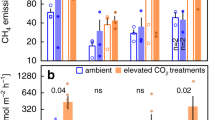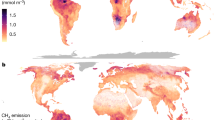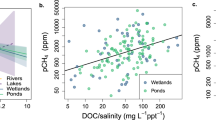Abstract
Lakes and ponds cover only about 4% of the Earth’s non-glaciated surface1, yet they represent disproportionately large sources of methane and carbon dioxide2,3,4. Indeed, very small ponds (for example, <0.001 km2) may account for approximately 40% of all CH4 emissions from inland waters5. Understanding how greenhouse gas emissions from aquatic ecosystems will respond to global warming is therefore vital for forecasting biosphere–carbon cycle feedbacks. Here, we present findings on the long-term effects of warming on the fluxes of GHGs and rates of ecosystem metabolism in experimental ponds. We show that shifts in CH4 and CO2 fluxes, and rates of gross primary production and ecosystem respiration, observed in the first year became amplified over seven years of warming. The capacity to absorb CO2 was nearly halved after seven years of warmer conditions. The phenology of greenhouse gas fluxes was also altered, with CO2 drawdown and CH4 emissions peaking one month earlier in the warmed treatments. These findings show that warming can fundamentally alter the carbon balance of small ponds over a number of years, reducing their capacity to sequester CO2 and increasing emissions of CH4; such positive feedbacks could ultimately accelerate climate change.
This is a preview of subscription content, access via your institution
Access options
Access Nature and 54 other Nature Portfolio journals
Get Nature+, our best-value online-access subscription
$29.99 / 30 days
cancel any time
Subscribe to this journal
Receive 12 print issues and online access
$209.00 per year
only $17.42 per issue
Buy this article
- Purchase on Springer Link
- Instant access to full article PDF
Prices may be subject to local taxes which are calculated during checkout



Similar content being viewed by others
References
Verpoorter, C., Kutser, T., Seekell, D. A. & Tranvik, L. J. A global inventory of lakes based on high-resolution satellite imagery. Geophys. Res. Lett. 41, 6396–6402 (2014).
Bastviken, D., Tranvik, L. J., Downing, J. A., Crill, P. M. & Enrich-Prast, A. Freshwater methane emissions offset the continental carbon sink. Science 331, 50 (2011).
Cole, J. J. et al. Plumbing the global carbon cycle: integrating inland waters into the terrestrial carbon budget. Ecosystems 10, 171–184 (2007).
Wik, M., Varner, R. K., Anthony, K. W., MacIntyre, S. & Bastviken, D. Climate-sensitive northern lakes and ponds are critical components of methane release. Nat. Geosci. 9, 99–106 (2016).
Holgerson, M. A. & Raymond, P. A. Large contribution to inland water CO2 and CH4 emissions from very small ponds. Nat. Geosci. 9, 222–226 (2016).
Yvon-Durocher, G. et al. Reconciling the temperature dependence of respiration across timescales and ecosystem types. Nature 487, 472–476 (2012).
Yvon-Durocher, G. et al. Methane fluxes show consistent temperature dependence across microbial to ecosystem scales. Nature 507, 488–491 (2014).
Allen, A. P., Gillooly, J. F. & Brown, J. H. Linking the global carbon cycle to individual metabolism. Funct. Ecol. 19, 202–213 (2005).
Marotta, H. et al. Greenhouse gas production in low-latitude lake sediments responds strongly to warming. Nat. Clim. Change 4, 467–470 (2014).
Yvon-Durocher, G., Jones, J. I., Trimmer, M., Woodward, G. & Montoya, J. M. Warming alters the metabolic balance of ecosystems. Phil. Trans. R. Soc. B 365, 2117–2126 (2010).
Yvon-Durocher, G., Montoya, J. M., Woodward, G., Jones, J. I. & Trimmer, M. Warming increases the proportion of primary production emitted as methane from freshwater mesocosms. Glob. Change Biol. 17, 1225–1234 (2011).
Atwood, T. B. et al. Warming alters food web-driven changes in the CO2 flux of experimental pond ecosystems. Biol. Lett. 11, 20150785 (2015).
Davidson, T. A. et al. Eutrophication effects on greenhouse gas fluxes from shallow-lake mesocosms override those of climate warming. Glob. Change Biol. 21, 4449–4463 (2015).
Liboriussen, L. et al. Effects of warming and nutrients on sediment community respiration in shallow lakes: an outdoor mesocosm experiment. Freshwater Biol. 56, 437–447 (2010).
Melillo, J. M. Soil warming and carbon-cycle feedbacks to the climate system. Science 298, 2173–2176 (2002).
Luo, Y., Wan, S., Hui, D. & Wallace, L. Acclimatization of soil respiration to warming in a tall grass prairie. Nature 413, 622–625 (2001).
Luo, Y. Terrestrial carbon-cycle feedback to climate warming. Annu. Rev. Ecol. Evol. Syst. 38, 683–712 (2007).
Bradford, M. A., Watts, B. W. & Davies, C. A. Thermal adaptation of heterotrophic soil respiration in laboratory microcosms. Glob. Change Biol. 16, 1576–1588 (2010).
Karhu, K. et al. Temperature sensitivity of soil respiration rates enhanced by microbial community response. Nature 513, 81–84 (2014).
Odum, E. P. The strategy of ecosystem development. Science 164, 262–270 (1969).
Yvon-Durocher, G. et al. Five years of experimental warming increases the biodiversity and productivity of phytoplankton. PLoS Biol. http://dx.doi.org/10.1371/journal.pbio.1002324 (2015).
Anderson-Teixeira, K. J., Vitousek, P. M. & Brown, J. H. Amplified temperature dependence in ecosystems developing on the lava flows of Mauna Loa, Hawai’i. Proc. Natl Acad. Sci. USA 105, 228–233 (2008).
Levin, S. A. Ecosystems and the biosphere as complex adaptive systems. Ecosystems 1, 431–436 (1998).
Whiting, G. J. & Chanton, J. P. Primary production control of methane emission from wetlands. Nature 364, 794–795 (1993).
Tranvik, L. J. et al. Lakes and reservoirs as regulators of carbon cycling and climate. Limnol. Oceangr. 54, 2298–2314 (2009).
Dean, W. E. The carbon cycle and biogeochemical dynamics in lake sediments. J. Paeleolimnol. 21, 375–393 (1999).
Likens, G. E. Primary Productivity of the Biosphere Vol. 14, 185–202 (Springer, 1975).
Kankaala, P., Huotari, J., Tulonen, T. & Ojala, A. Lake-size dependent physical forcing drives carbon dioxide and methane effluxes from lakes in a boreal landscape. Limnol. Oceangr. 58, 1915–1930 (2013).
Bastviken, D., Cole, J., Pace, M. & Tranvik, L. Methane emissions from lakes: dependence of lake characteristics, two regional assessments, and a global estimate. Glob. Biogeochem. Cycles 18, GB4009 (2004).
Dossena, M. et al. Warming alters community size structure and ecosystem functioning. Proc. R. Soc. B 279, 3011–3019 (2012).
Bastviken, D., Ejlertsson, J. & Tranvik, L. Measurement of methane oxidation in lakes: a comparison of methods. Environ. Sci. Technol. 36, 3354–3361 (2002).
Sanders, I. A. et al. Emission of methane from chalk streams has potential implications for agricultural practices. Freshwater Biol. 52, 1176–1186 (2007).
Wilhelm, E., Battino, R. & Wilcock, R. J. Low-pressure solubility of gases in liquid water. Chem. Rev. 77, 219–262 (1977).
Staehr, P. A. et al. Lake metabolism and the diel oxygen technique: state of the science. Limnol. Oceanogr. Methods 8, 628–644 (2010).
Hedges, J. I. & Stern, J. H. Carbon and nitrogen determinations of carbonate-containing solids. Limnol. Oceangr. 29, 657–663 (1984).
Zuur, A., Ieno, E., Walker, N. & Saveliev, A. Mixed Effects Models and Extensions in Ecology with R (Springer, 2009).
Acknowledgements
This study was supported by a grant from the Natural Environment Research Council of the UK (NE/H022511/1) awarded to M.T., G.Y.-D. and G.W.
Author information
Authors and Affiliations
Contributions
M.T. and G.Y.-D. conceived the study. C.J.H. and G.Y.-D. conducted the experiments. G.Y.-D., C.J.H. and M.T. analysed the data. G.Y.-D. wrote the manuscript and all authors contributed to revisions.
Corresponding authors
Ethics declarations
Competing interests
The authors declare no competing financial interests.
Supplementary information
Supplementary Information
Supplementary Information (PDF 2264 kb)
Rights and permissions
About this article
Cite this article
Yvon-Durocher, G., Hulatt, C., Woodward, G. et al. Long-term warming amplifies shifts in the carbon cycle of experimental ponds. Nature Clim Change 7, 209–213 (2017). https://doi.org/10.1038/nclimate3229
Received:
Accepted:
Published:
Issue Date:
DOI: https://doi.org/10.1038/nclimate3229
This article is cited by
-
Direct biological fixation provides a freshwater sink for N2O
Nature Communications (2023)
-
Challenges and opportunities in the use of ponds and pondscapes as Nature-based Solutions
Hydrobiologia (2023)
-
Another step towards a unifying theory for ecosystems?
Journal of Biosciences (2023)
-
Organic carbon in British lowland ponds: estimating sediment stocks, possible practical benefits and significant unknowns
Hydrobiologia (2023)
-
Metabolic plasticity can amplify ecosystem responses to global warming
Nature Communications (2022)



